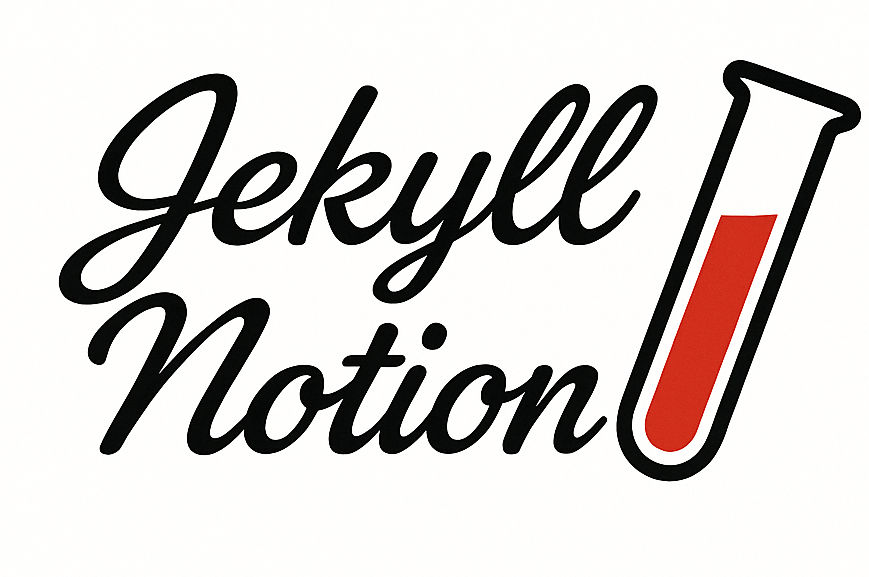Import Notion pages into Jekyll.
📚 Learn more with these guides:
Install via RubyGems:
gem install jekyll-notionOr add it to your Gemfile:
# Gemfile
gem 'jekyll-notion'Important
If you are using jekyll-archives, list jekyll-notion before
jekyll-archives in the Gemfile. Otherwise, imported pages will not
be picked up.
See the discussion
here.
Then enable the plugin in _config.yml:
plugins:
- jekyll-notionBefore using the gem, create a Notion integration and generate a secret token.
Export the token as an environment variable:
export NOTION_TOKEN=<secret_...>Share a Notion
database,
then specify its id in _config.yml:
notion:
databases:
- id: 5cfed4de3bdc4f43ae8ba653a7a2219bBy default, entries will be added to the posts collection.
You can also define multiple databases:
collections:
- recipes
- films
notion:
databases:
- id: b0e688e199af4295ae80b67eb52f2e2f
- id: 2190450d4cb34739a5c8340c4110fe21
collection: recipes
- id: e42383cd49754897b967ce453760499f
collection: filmsAfter running jekyll build or jekyll serve, the posts, recipes,
and films collections will contain pages from the specified databases.
Each database supports the following options:
id: the unique Notion database IDcollection: which collection to assign pages to (postsby default)filter: a database filtersorts: database sorting criteria
notion:
databases:
- id: e42383cd49754897b967ce453760499f
collection: posts
filter: { "property": "Published", "checkbox": { "equals": true } }
sorts: [{ "timestamp": "created_time", "direction": "ascending" }]By default, the Notion page created_time property sets the post
filename date. This value is used for Jekyll's date
variable`.
Since created_time cannot be modified, you can override it by adding a
custom Notion property named date (or Date). That property will be
used instead.
You can also load individual Notion pages:
notion:
pages:
- id: 5cfed4de3bdc4f43ae8ba653a7a2219bMultiple pages are supported:
notion:
pages:
- id: e42383cd49754897b967ce453760499f
- id: b0e688e199af4295ae80b67eb52f2e2f
- id: 2190450d4cb34739a5c8340c4110fe21The generated filename is based on the Notion page title (see Page filename).
All page properties are exposed as Jekyll front matter. For example, if
a page has a permalink property set to /about/, Jekyll will generate
/about/index.html.
Instead of adding Notion pages to collections or pages, you can store
them under the Jekyll data object using the data option:
notion:
databases:
- id: b0e688e199af4295ae80b67eb52f2e2f
- id: e42383cd49754897b967ce453760499f
data: films
pages:
- id: e42383cd49754897b967ce453760499f
- id: b0e688e199af4295ae80b67eb52f2e2f
data: aboutEach page is stored as a hash. The page body is available under the
content key.
Example:
<ul>
{% for film in site.data.films %}
<li>{{ film.title }}</li>
{% endfor %}
</ul>
{{ site.data.about.content }}Other properties are mapped normally (see Notion properties).
Since version 2.4.0, all Notion requests are cached locally. Only the first request fetches from Notion; subsequent builds use the cache, greatly reducing build times.
The cache uses the vcr gem. Each resource (page or database) is stored in a file named after its Notion ID, e.g.:
.cache/jekyll-notion/vcr_cassettes/e42383cd49754897b967ce453760499f.yml
Note: enabling
cachedisables the deprecatedfetch_on_watchoption.
Default: .cache/jekyll-notion/vcr_cassettes
You can override it in _config.yml:
notion:
cache_dir: another/folderThe path must be relative to the project root.
Delete the cache folder to clear everything, or remove an individual file matching the Notion resource ID.
To disable caching entirely:
notion:
cache: falseNotion page properties are mapped into each Jekyll document's front matter.
See the companion gem notion_to_md for details.
Jekyll distinguishes between posts and other documents:
- Posts: filenames follow the format
YEAR-MONTH-DAY-title.MARKUP, where the date comes from the Notioncreated_time(or thedateproperty if present).\ - Other documents: filenames are derived from the Notion page title.
